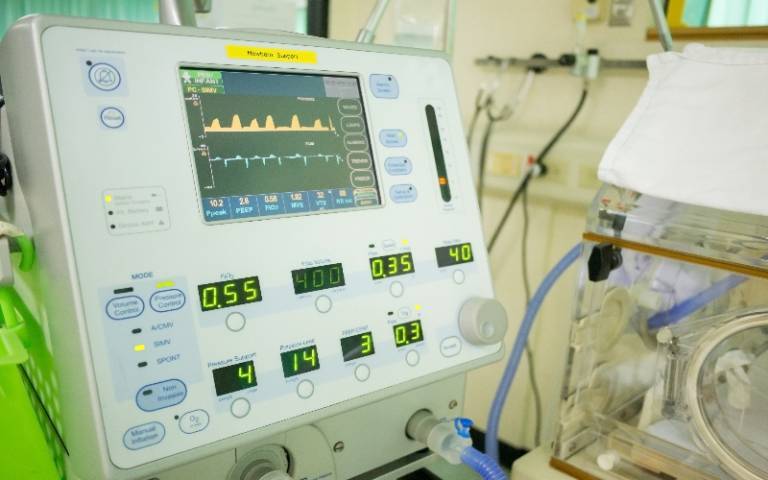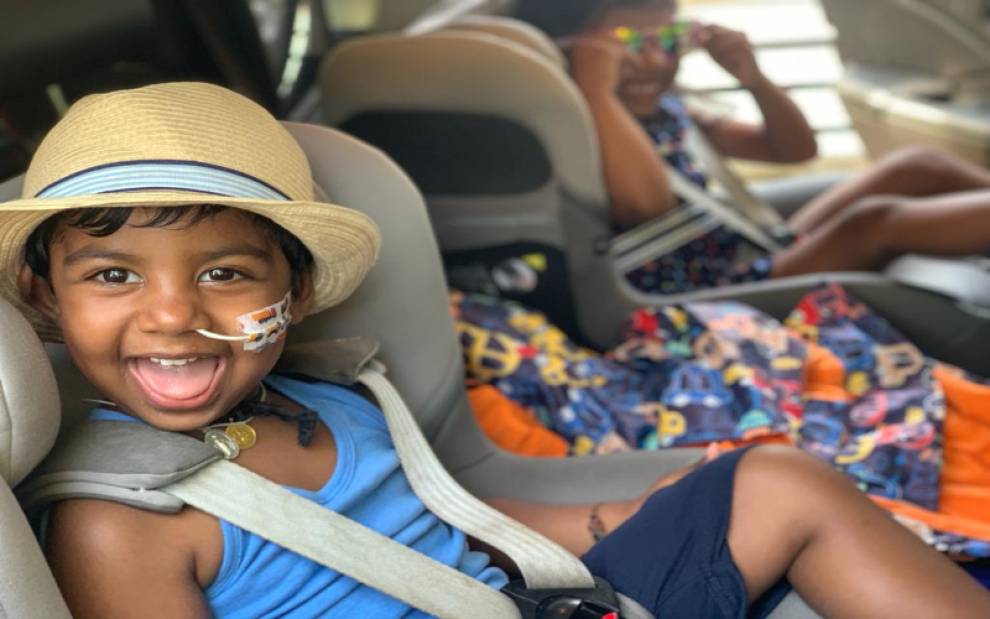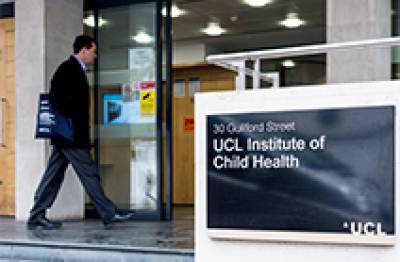Reducing oxygen levels for children in intensive care will save lives
4 December 2023
Reducing oxygen levels in critically ill children on mechanical ventilators in intensive care could save tens of young lives each year, finds a new study led by researchers at UCL and Great Ormond Street Hospital.

The study, funded by the National Institute for Health and Care Research and published in The Lancet, also found that lower levels of oxygen would reduce the number of days children spent on machines supporting organs, saving the NHS £20million every year.
Lead author, Professor Mark Peters (UCL Great Ormond Street Institute of Child Health and Consultant Paediatric Intensivist at GOSH), said: “Giving the minimum safe dose of anything in intensive care appears to generate the best outcomes, so we wanted to test this approach with oxygen. We found a small benefit of lower oxygen targets that is unlikely to have been due to chance. But because so many children are treated with oxygen, this has the potential to improve outcomes and reduce healthcare costs in the UK and around the world.
“This could have particular implications in countries where oxygen is a scare resource, or in situations as we have seen in recent years, where health needs change, and oxygen demand quickly peaks.”
In the UK, around 20,000 children are admitted to intensive care each year and roughly 75% will receive additional oxygen through a ventilator.
Oxygen is one of the most common treatments used in emergency situations. Doctors and nurses adjust oxygen treatment based on how much oxygen their patient has in their blood. While very low oxygen levels are harmful, current research shows that slightly lower than normal levels may be the best target for very ill people.
The Oxy-PICU study is the largest randomised controlled trial ever conducted in paediatric intensive care units (PICUs). It was led by researchers from UCL and Great Ormond Street Hospital (GOSH), the Intensive Care National Audit & Research Centre (ICNARC) and the Paediatric Critical Care Society Study Group (PCCS-SG).
The researchers recruited 2,040 children from 15 NHS PICUs across England and Scotland. Each of the children required a mechanical ventilator and extra oxygen on admission to the PICU.
The children, who ranged from newborn up to 16 years, were randomly allocated to one of two groups, either receiving oxygen to the standard target level (saturation “SpO2” > 94%), or a reduced oxygen target (SpO2 88-92%). The percentages refer to the proportion of the oxygen-carrying capacity of the blood that is being used.
The researchers found that the children who received the lower level of oxygen were 6% more likely to have a better outcome, either in terms of survival or the number of days spent on machines supporting their organs.
The researchers anticipate that if the approach was scaled up across the NHS, it could save 50 lives, 6,000 ICU bed days and £20million annually in the UK alone.
The Oxy-PICU study is funded by the NIHR’s Health Technology Assessment programme and supported by the NIHR’s Biomedical Research Centres at GOSH and UCLH.
Lauran O’Neill, Senior Critical Care Nurse at GOSH, said: “This is a major milestone study, which was nurse-led, with research taking place at the bedside as part of normal clinical care. It’s a great example of a research-hospital vision as every child admitted to ICU was screened for inclusion into the study.”
Professor Marian Knight, Scientific Director for NIHR Infrastructure, said: “The main purpose of all NIHR health and care research is to save or improve lives in some way, whether by questioning what we currently do or introducing new practice.
“This landmark nurse-led study has challenged the accepted practice for providing oxygen to children in intensive care in a way that could have a global impact. We are proud to have supported Professor Peters and his team through both our Health Technology Assessment programme, our Biomedical Research Centre at GOSH, and with our remarkable NIHR research nursing staff.”
Patient story
When two-year-old Noah Karunananthan was diagnosed with leukaemia in May 2022 after a trip to A&E at Hillingdon Hospital, his family were devastated. Noah lives with his mum Dilly, dad Sabe and twin sister Naima in Hillingdon, West London. In order to give him the medication he urgently needed, the doctors had to sedate him, and he was quickly transported for treatment at Great Ormond Street Hospital (GOSH).

Noah was in the ICU for around 4 days to support his organs while he received care. While there, his parents consented to him taking part in the Oxy-PICU trial as part of his recovery journey. He was later transferred to the oncology ward.
Dilly said: “I was so stunned when we got to the ICU, it was like a spaceship. I was in awe of all the machines, in shock really, and exhausted as it was the middle of the night.
“He was started on the Oxy-PICU trial before the team took us there in the ambulance. He had the new treatment of lower oxygen saturation targets.
“Noah had a brain biopsy to extract a suspected fungal infection – this scared the hell out of us. What was amazing was how he recovered. For three months he’d had almost no facial expressions – we hadn’t seen him smile. But then his daily Occupational Therapist Mary came one day and you could see him try to smile at her toys. After that session we could see him slowly getting better.
“This September, we signed up to nursery and we were worried Noah may not be able to do a full day but he’s thriving there! This is the first time we have been separated for longer periods and I can see that he loves learning and exploring.
“If Noah, or we as a family, can help children, parents and families through research we are happy to. He was one of the first people to try many of the research projects we have signed up to and it makes us proud that Noah has been able to help give some answers that may have helped him and could now help someone else and it’s all part of our journey.”
Links
- Research in The Lancet
- Professor Mark Peters's academic profile
- UCL Great Ormond Street Institute of Child Health
- UCL Population Health Sciences
Image
- Main image. Credit: Bibiz1 on iStock
- Noah Karunanantha. Credit: GOSH
Media contact
Poppy Danby
E: p.danby [at] ucl.ac.uk
 Close
Close


